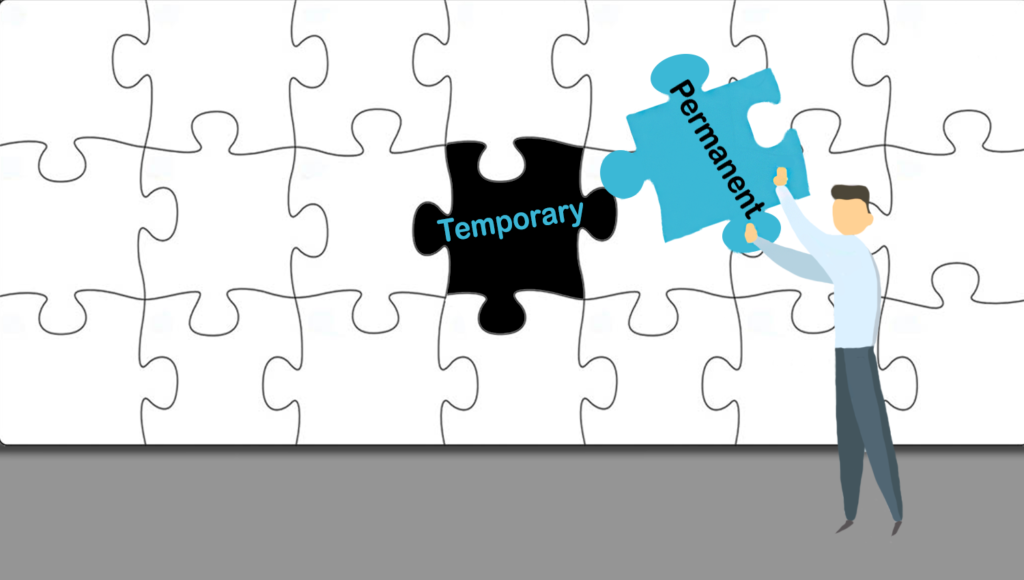Travel and temporary job opportunities are not entirely new, but they have evolved quite a bit in recent years. With the state of healthcare and jobs as a whole entirely uncertain, 2020’s coronavirus pandemic brought temporary-to-permanent positions to the front of hiring managers’ minds.
Temporary-to-permanent job opportunities are positions that start as temporary, but are defined with timelines and conditions for candidates to be hired on permanently. This differs from temporary contracts as it creates the mindset of both the company and the candidates that the position is there for both sides to decide if they are interested in continuing the arrangement.
While the beginning instability of the pandemic has passed, temporary-to-permanent positions have continued to thrive because they create a mutually beneficial trial period for potential employees and workplaces. When properly utilized, both sides of this partnership can reap major benefits without the usual downsides of temporary or permanent positions.
Benefits of Temporary-to-Permanent Offers
There are far more benefits than negatives that come with temporary-to-permanent offers, but they can be easy to overlook if you get hung up on the idea of the opportunity possibly only being temporary. Take a step back and think of the aspects of a temporary-to-permanent opportunity realistically.
Instead of being scared of the temporary aspects of the opportunity, look at them for the benefits they truly are. It is only because this position starts as a temporary role that both companies and employees spend an equal effort trying to impress and engage the other. Unlike probationary periods at the start of permanent roles, which are stressful and overbearing for incoming employees, temporary-to-permanent roles divide those stressors so that both groups are working hard to create a solid foundation of trust to build a long-term career on.
Additionally, a position like this guarantees a period of time, usually sooner rather than later, where the new employee and the company will come back together to discuss whether continuing with a permanent role is a good fit for either party. If the company and employee are both interested in each other, then negotiations for a permanent contract can take place and candidates can feel comforted in being able to tell if the deal is fair, as they have already experienced the work.
If either the candidate or the company decide not to move forward, then it is often little-to-no skin off either of their backs. Both sides began the contract with the acknowledgement that the opportunity could be temporary, so smart companies will keep the job posting open and smart candidates will pursue temporary living opportunities while there, as neither is required to fully commit until permanency is established.
There is also the major financial benefit to both parties that comes with flexible situations like this. Candidates who regularly pursue temporary jobs are likely aware that a job such as that often pays a significant amount more than a permanent position doing the same work might offer, meaning that they stand to have a nice financial boost for the period of the temporary portion. As mentioned above, this goes further to give negotiating power to candidates who are offered permanent roles, as they can justify asks for increases or other benefits with their experiences on site.
Companies who pursue temporary-to-permanent roles reap benefits as well. By starting the hiring phase with a temporary offer, the company has the wiggle room to determine if a candidate is right for the job without risking severance fees or wasted time on processing starter paperwork. Additionally, it also allows the company to save face with the community they are hiring from, as they are allowed to terminate the contract without hard feelings at the end of the temporary period.
Is Temporary-to-Permanent Right for You?
So how can you tell if an opportunity like this is right for you? It can be difficult to say for sure, as there is always a drive for the security that comes from absolutely knowing what your situation is, be it temporary or permanent.
That being said, one of the best ways to figure out if this is a type of opportunity that is worth trying is to write down what you are looking for in a job. Create a list of absolutes that you need to have in your next position, but only things that you are entirely not willing to budge on. If you think there is an element that you prefer, but could be swayed, then keep it in mind, but do not include it in the list.
After listing out what elements you are dead-set on pursuing, see if they conflict with the opportunity. Be honest with yourself and compare the job posting to your list. If something in the job posting makes you question something on the list, then cross it off. If you find that the position and your list have no conflicts, then, due to the nature of this type of opportunity, you quite literally have nothing to lose by pursuing it, even if it ends up just being a short-term job.
Ultimately, though, there are many factors that go into determining if a job offer is right for you, whether it is temporary-to-permanent, or because of other conditions. A great way to ensure that you are getting the best possible job offer or candidate for an open role is to match up with a Radius Recruiter and let us help you out!
Our specialized recruiters work with all areas of healthcare, so if you are looking for help hiring, then click here or, if you are looking for help finding a new opportunity, then send us an updated resume here or apply to an open job here.











